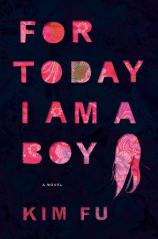Reading Group Guide
Discussion Questions
For Today I Am a Boy

1. Before reading the novel, what did the title mean to you?
2. Fu quotes from the song "For Today I Am a Boy" by Antony and the Johnsons: “One day I’ll grow up, I’ll be a beautiful woman. One day I’ll grow up, I’ll be a beautiful girl. But for today, I am a child. For today, I am a boy.” What questions does this quotation create? Does this reference create any nuances to the title?
3. The prologue provides two versions of the oldest sister’s birth: the mother’s version and the butcher’s version. Which version do you believe? Why? What does this duplicity foreshadow?
4. As a young child, Peter completed the assignment “What I Want to Be When I Grow Up.” Peter drew himself as a woman and wrote “I want to be a Mommy.” Two days later he found that page ripped from his notebook. Who do you think tore this page? Why? What does Peter’s assignment say about him as a child?
5. The next year in school Peter completes the same assignment and draws a picture of a fireman rescuing a woman. Peter says he wants to be a fireman, but he “only imagines being the woman.” Peter leaves the notebook open on the table at home. Why does Peter say one thing and think another? What has he learned from the first assignment to the second? Why does he leave the notebook open?
6. How would you describe Peter’s father disciplinary approach? Do you find it fair and/or effective?
7. Peter grows up associating with boys like Roger and Ollie who are rough, physical, and crude. Peter tries to belong but often finds himself in difficult situations. While these situations often offer a bit of comic relief for the reader, Peter flounders in frustration and panic. One situation requires Peter to pee standing up, something he has never done. Why do you think Peter has never peed standing up? Discuss other examples of Peter’s frustration with belonging.
8. A significant moment in Peter’s life occurs when he is six and yells to his sisters that he is not a boy. What causes this episode? What does Peter want? Do you think this is a question of “nature vs. nurture?”
9. Another powerful moment occurs when Peter is pushed by Roger and Ollie to attack a young girl. When Peter returns home, his mother slaps him, yet his father smiles and tells him he will have his own room. How does Peter handle these mixed messages?
10. Not much interaction occurs between Peter and his father, yet those moments when interaction does occur provides powerful pictures about men and women. Consider when Peter’s father says “Women bleed more” or when her refers to “Women’s work.” What do these moments create for Peter?
11. Peter tells Ollie that he does not like thinking about sex, but he loves “the way the cooks at the restaurant talked about sex.” Peter adds that their talks were “over the top enough, absurd enough, that it didn’t feel real.” Why does Peter like these conversations about sex?
12. Maintaining a balance between wanting to belong and still being different presents difficulties for Peter, yet he maintains this balance. When he exercises with Ollie, he references a woman with a powerful physique. Ollie finds it normal to be “hulking and large,” so he accepts Peter’s desire. Peter finds comfort in a common bond with Ollie: they both “wanted different bodies.” Is Peter hiding? Or coping? How far should a person attempt to change himself/herself?
13. “I don’t know why any of us like or dislike people based on so little” (91). Why do you think society has difficulty accepting people who do not fit the “normal” stereotype?
14. Chef shares the story of how he had sex with a man he thought was a woman. Peter fixates on the conversation between Chef and Simon. With whose perspective about this episode do you agree? Do you think it is wrong of people to deceive others about such matters? Why?
15. “There was a deep-down, physical ache. The opposite of a phantom limb: pain because that thing, that thing I loathed, was always there. I had to use it and look at it every day. But more than that, pain because I wanted to be seen. I wanted to be noticed, in a way that both men and cooks were not” (116). Why do so many people want to be noticed? Consider current trends, such as body piercings, tattoos, gender issues, sexuality choices. Do you think many of these impulses to create alterations with bodies are genuine or reflect t a need to be noticed?
16. “Get out of my house. Both of you. I gave up everything for you. He made me give up everything for you, you ungrateful, useless children. You garbage. You faggots and whores” (156). What causes his mother’s meltdown? Does she have justification? In what ways are Peter and his mother alike?
17. “Who understood that we were both frauds, who was even happy to be free of me? I needed it that way, so that I could forget her, so I could go on thinking of myself as a victim of the world” (179). Do you think Peter is a victim? Explain.
18. After finding some friends who seem to understand and endorse Peter’s situation, Peter begins to experience life as a woman. He dances with a man during a Halloween party, yet part of him will not let go of his plight: “It’s Halloween, it’s just a game, it isn’t real.” What is it Peter needs to feel secure? Peter’s friend John wants him to attend the vigil for “Dana,” a boy born Daniel who chose to live life as a girl and as a result was beaten to death. Peter initially does not want to attend, rationalizing “I’ve worked my whole life so that it couldn’t be me.” John calls him a coward. Is Peter a coward? Explain. Do you understand Peter’s justifications? Do you agree with John?
19. Peter remembers Claire saying that “Even Jesus didn’t want to be Jesus. He cried out at the last minute” (235). What is Claire asking Peter to do?
20. Eileen provides the final catalyst for Peter. “You don’t have to look like that to be a woman. That’s not what being a woman means” (237). Explain Eileen’s statement. Do you agree with her? What does it mean to be a woman? Man? Person?
21. Fu ends her novel with Peter’s grandfather telling Peter’s father to go be reborn and then Peter sitting with his sisters and Bonnie saying, “We’re sisters...This is Adele, Helen, and Audrey” (239). Peter said earlier in the novel that he “could not pin down what would be enough, other than resetting time, going back before my birth, before my conception, and finding a way to choose” (115). Has Peter found peace and acceptance?
For Today I Am a Boy
- Publication Date: January 14, 2014
- Genres: Fiction, Gay & Lesbian
- Hardcover: 256 pages
- Publisher: Houghton Mifflin Harcourt
- ISBN-10: 0544034724
- ISBN-13: 9780544034723







